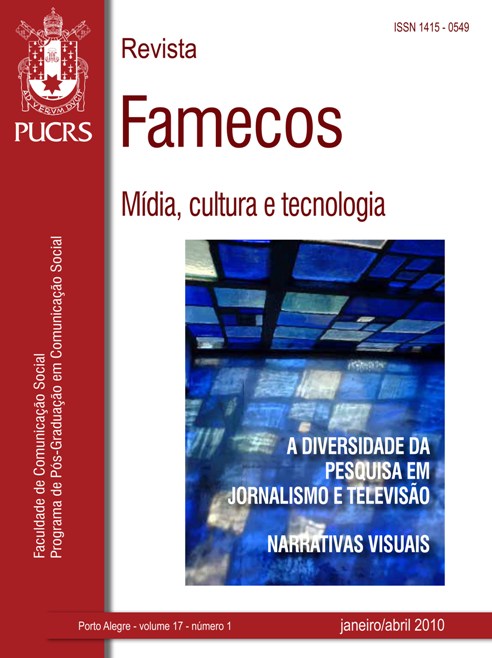Who laughs last laughs best? An analysis of mood in hypermodernity from the program Cost What to Cost
DOI:
https://doi.org/10.15448/1980-3729.2010.1.6880Keywords:
Humor, hypermodernity, CQCAbstract
Authors like Lipovetsky (2004) and Minois (2003) state that the modern laughter, based on the enlightenment thought, aimed to bring light and criticism to people, making them think about the world they lived in, in order to try and change it. On the other hand, laughter in our hypermodern age, captured by the mass media and publicity, present itself as empty of meaning, uncompromised and aiming only at being fun, cool and entertaining, as well as at stimulating consumption. To what extent is it possible to accept such hypothesis? Is it really impossible for contemporary humor to produce anything but shallow entertainment and alienation? In an attempt to discuss these issues we shall analyze the brazilian television program “CQC” (Custe o que custar, which can be loosely translated into “Whatever it takes” or WIT), broadcasted by Rede Bandeirantes de Televisão. We shall use as methodological approach a study of a focal group carried through with young television viewers from Fortaleza, Ceará.Downloads
References
ACSELRAD, Marcio e DOURADO, Gabriela. O humor corrosivo dos meios e a política: o CQC vai ao Congresso Nacional. Revista Famecos: Midia, cultura e tecnologia, revista do programa de pós graduação da PUCRS , v. 1, n. 39, 2009.
ACSELRAD, Marcio. O humor como estratégia de comunicação. Compós – Associação Nacional dos Programas de Pós-Graduação em Comunicação. Disponível em: http://www.compos.org.br/data/
biblioteca_112.PDF Acesso em: 31 set. 2008.
ANDERSON, Perry. As origens da Pós-modernidade. Rio de Janeiro: Jorge Zahar, 1999.
ARRUDA, José Jobson de A. História Moderna e Contemporânea. São Paulo: Ática, 1975.
AUBOUIN, Elie. Les genres du risible: ridicule, comique, esprit, humour. Marseilles: OFEP, 1948.
BAKHTIN, Mikhail. A cultura popular na Idade Média e no Renascimento – o contexto de François Rabelais. 2 ed. São Paulo: HUCITEC, 1999.
BARBOSA FILHO, Milton B. História Moderna e Contemporânea. São Paulo: Scipione, 1993.
BARBOSA, Gustavo Guimarães; RABAÇA, Carlos Alberto. Dicionário de comunicação. São Paulo: Ática, 1987.
BERGSON, Henri. O riso: ensaio sobre a significação da comicidade. Tradução de Ivone Castilho Benedetti. São Paulo: Martins Fontes, 2004.
BREMMER, Jan; ROODENBURG, Herman (Org.). Uma história cultural do humor. Tradução de Cynthia Azevedo e Paulo Soares. Rio de Janeiro: Record, 2000.
ESCARPIT, Robert. L’humour. Paris: PUF – Presses Universitaires de France, 1960.
EVRARD, Franck. L’humour. Paris: Hachette, 1996. HOUAISS, Antonio. Dicionário Houaiss da Língua Portuguesa. 1. ed. Objetiva, 2001.
JAMESON, Frederic. Postmodernism or the cultural logic of late capitalism. New Left Review. London: 1982.
LIPOVETSKY, Gilles; CHARLES, Sébatien. Os tempos hipermodernos. Tradução de Mário Vilela. São Paulo: Barcarolla, 2004.
LIPOVETSKY. Gilles. A Era do Vazio: ensaios sobre o individualismo contemporâneo. Editora: Manoele, 2005.
LYOTARD, Jean François. A Condição Pós-Moderna. Lisboa: Gradiva, 1979.
MINOIS, Georges. História do riso e do escárnio. Tradução de Maria Elena O. Ortiz Assumpção. São Paulo: UNESP, 2003.
NEUMANN, Laurício. Características e Dimensões Éticas da Modernidade e da Pós-Modernidade. DCS. Disponível em: http://www.dcs.org.br/documentos/carac_dim_eticas_da_modernidade.doc
PINTO, Ziraldo A. Ninguém entende de humor. Revista de Cultura Vozes. Petrópolis, ano 64, n. 3, abr. 1970.
PROPP, Vladimir. Comicidade e riso. São Paulo: Ática, 1992.
RAMONET, Ignácio. Géopolitique du chaos. Paris: Editora Galilée, 1997.
Revista Época. São Paulo: Globo. EPOCA, 9 jun. 2003.
SANTOS, Jair Ferreira dos. O que é pós-moderno. São Paulo: Brasiliense, 1986.
SIQUEIRA, Holgonsi Soares Gonçalves. Ciência pósmoderna. Jornal “A Razão”. Pós Modernidade, Política e Educação. Disponível em: http://www.angelfire.com/sk/holgonsi/cienciaposmoderna.html
STABILE, Carol A. “Pós-modernismo, feminismo e Marx: notas do abismo”. In: WOOD, Ellen M.; FOSTER, John. B (Orgs.). Em defesa da história. Rio de Janeiro: Zahar, 1999.
SWIFT, Jonathan. In: Viagens de Gulliver. Virtual Ebooks, 2000.
TAVE, Stuart M. A amável humorista: um Estudo do Cômico e Teoria Crítica do Séculos XVIII e XIX Precoce. Chicago: U of Chicago P, 1960.
TOMÉ, Cristina Maria de Sousa. Entre o Burlesco e o Sublime – A sátira gráfica de William Hogarth e James Gilray. 2000. Dissertação (Mestrado) – Universidade do Minho.
TRAVAGLIA, Luiz Carlos. Uma introdução ao estudo do humor pela lingüística. Revista de Documentação de Estudos em Lingüística Teórica e Aplicada (D.E.L.T.A.), São Paulo, v. 6, n. 1, fev. 1990.
Downloads
Published
How to Cite
Issue
Section
License
Copyright
The submission of originals to Revista Famecos implies the transfer by the authors of the right for publication. Authors retain copyright and grant the journal right of first publication. If the authors wish to include the same data into another publication, they must cite Revista Famecos as the site of original publication.
Creative Commons License
Except where otherwise specified, material published in this journal is licensed under a Creative Commons Attribution 4.0 International license, which allows unrestricted use, distribution and reproduction in any medium, provided the original publication is correctly cited.






